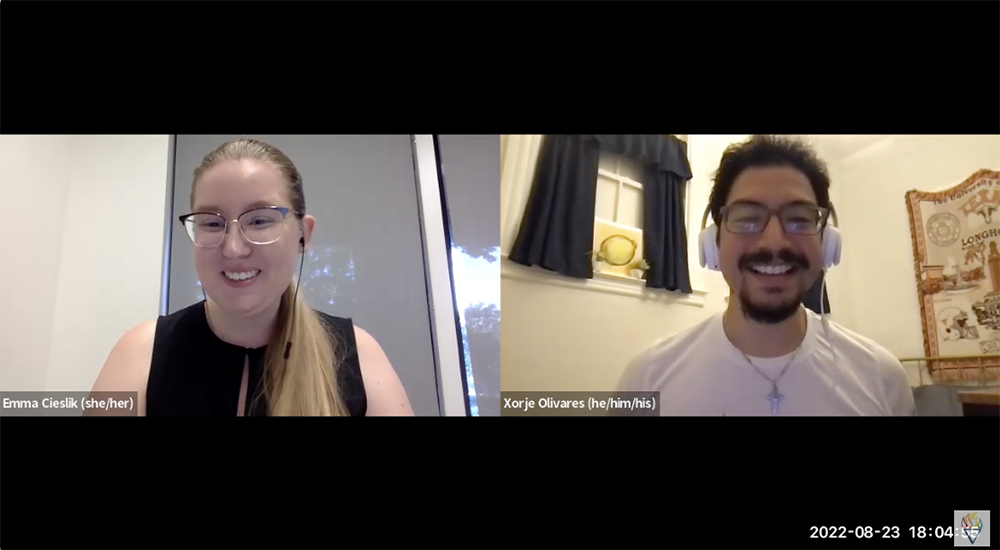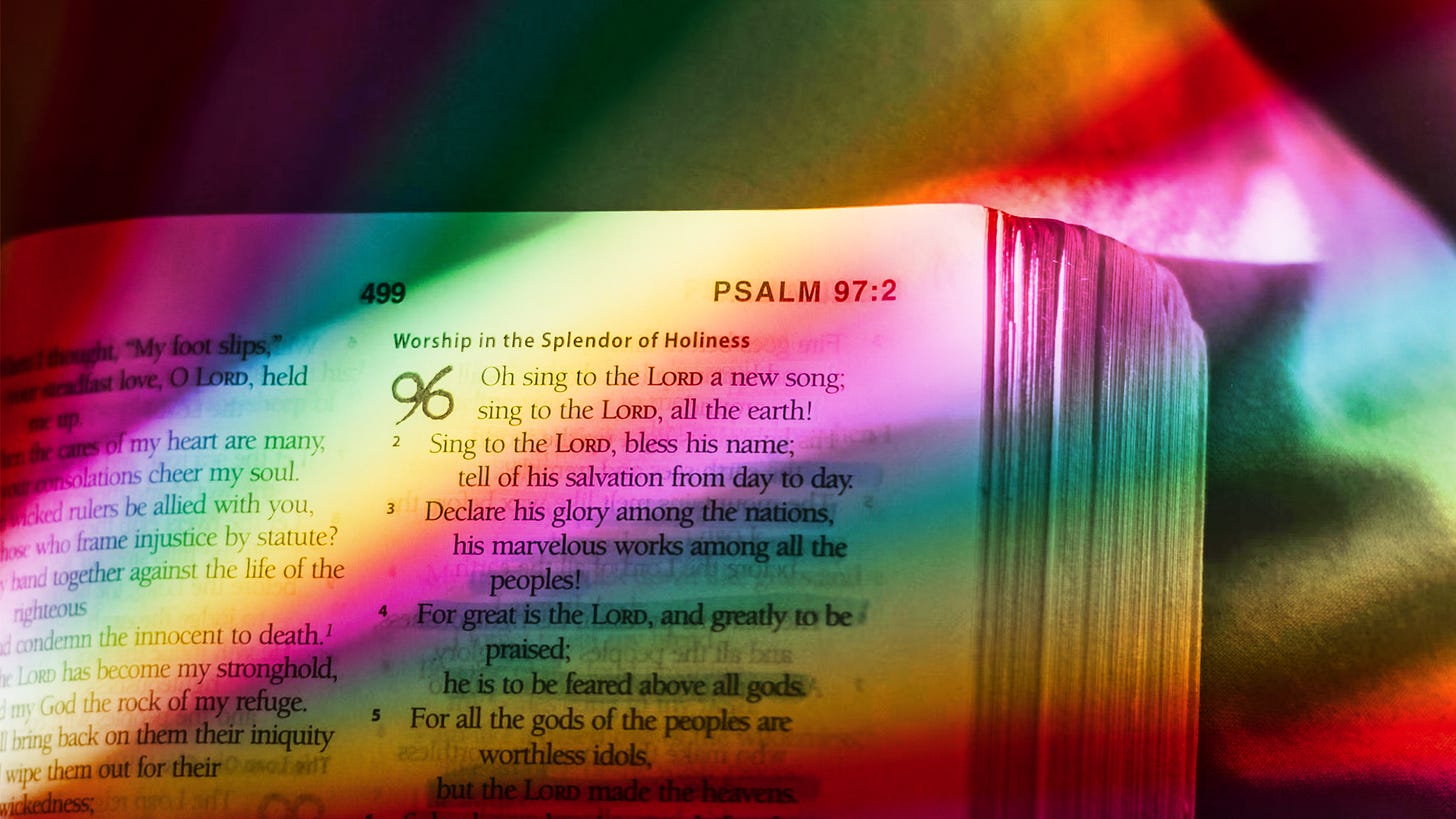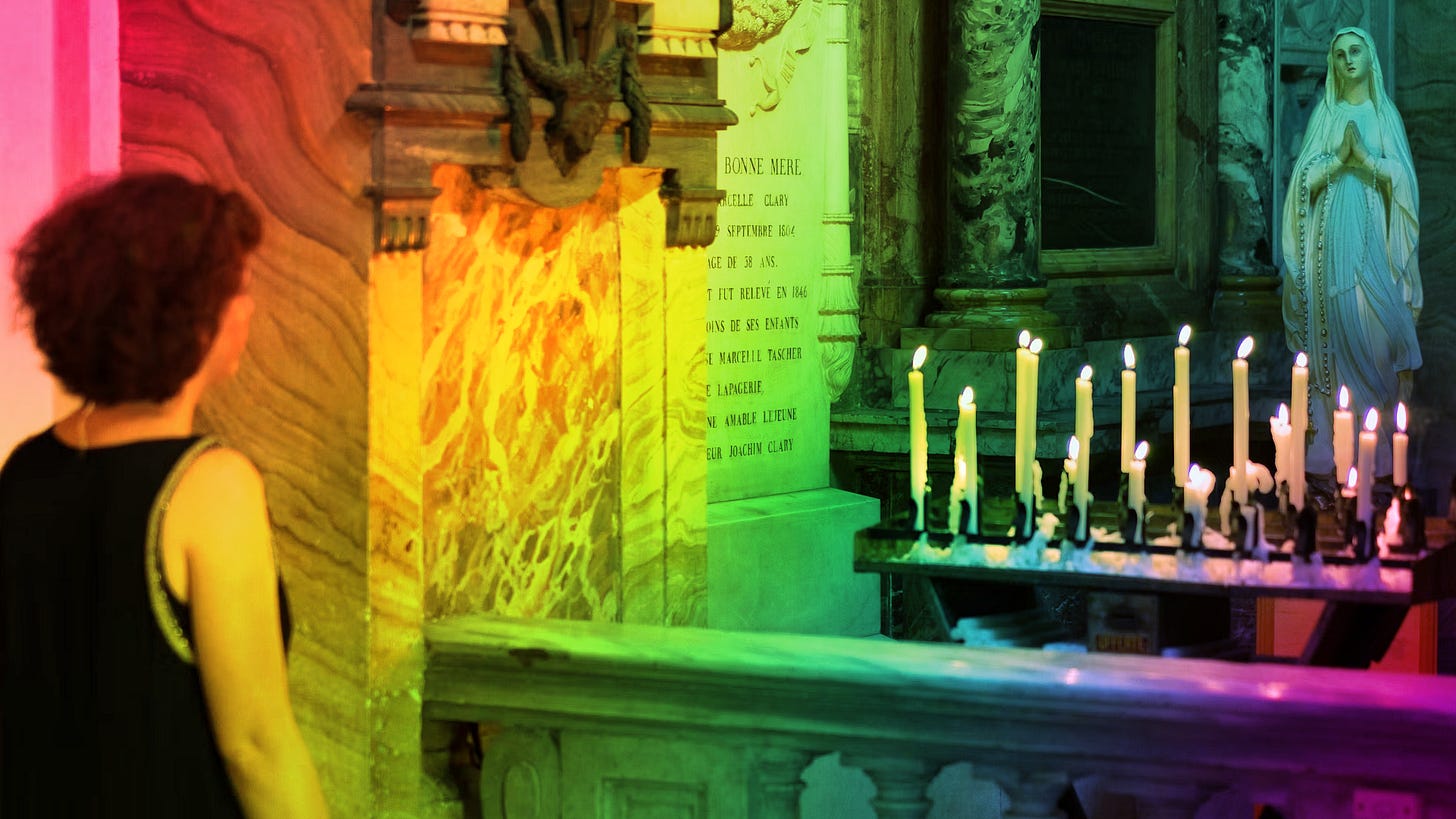8 Queer Theologians to Learn From
Every Sunday at Mass, Catholics gather to hear the Gospels: the stories of Jesus healing, challenging, and calling people into deeper love. After the readings, the priest reflects on what these stories mean for our lives today. But what happens when the people hearing those words—LGBTQ+ people, immigrants, those on the margins—are the very ones being pushed out by the Church?
That’s one place queer Catholic theologians come in. These are people of faith who love the Church deeply and also ask hard, honest questions. They draw from the tradition of liberation theology, a way of thinking about faith that puts the needs of the poor and oppressed at the center. Liberation theology reminds us that the Gospel is not just a narrative for the default, heteronormative church goer but is a call to justice that relies on the full participation of everyone.
Queer theology helps us see that LGBTQ+ people are not just included in God’s love as sort of secondary or less important players but are essential to the life of the Church. In a time when religion is being twisted to justify explicit calls for violence and the rejection of empathy, (especially against queer and trans people), queer theologians return us to Jesus’s core message: love your neighbor, welcome the outcast, and stand up against injustice.
Today, we’re highlighting eight queer Catholic theologians and thinkers whose work is helping to build a Church that reflects the radical love of Jesus. We hope their insights will inspire and challenge you as much as they have us.
Note: We will return to the podcast this upcoming Monday with an episode devoted to discussing Pope Leo’s first four months and the LGBTQ Pilgrimage that took place recently in Rome.
1). Dr. Bryan Massingale
Dr. Bryan Massingale is a Black, gay Catholic priest who began his ministry during one of the most painful chapters in LGBTQ+ history: the HIV/AIDS crisis. Early in his priesthood, he presided over a funeral for a gay man whose family demanded no mention of his partner, his illness, or his truth. That silence, Massingale later said, was one of the many ways the Church and society abandoned those who most needed compassion.
But for Massingale, faith has never been about silence. His theology is rooted in the radical, inclusive love of Jesus: a love that demands we confront racism, homophobia, and the ways they are often fused together in systems like white Christian nationalism. Drawing on liberation theology and thinkers like James Cone and Audre Lorde, he challenges Catholics to see the Gospel as a call to justice, especially for those who are both Black and queer, who have so often been erased or excluded.
In a 2022 keynote at the Church of St. Paul the Apostle, he named white nationalism as the greatest threat to queer and marginalized communities today. Quoting Jamal Jordan’s Queer Love in Color, he reminded the Church: we cannot truly love ourselves—or one another—if the world refuses to see us as worthy of love. Massingale’s work is a call not only to inclusion, but to transformation. The Church, he insists, must become a place where no one is left to die alone, erased.
Related: Check out our podcast episode on “What is Catholic nationalism?”
2). Dr. Melissa Pagán
Dr. Melissa Pagán is a Catholic ethicist who brings a powerful voice to the conversation about justice, rooted in both deep faith and a clear-eyed view of history. As a queer Latina theologian and feminist, she asks a simple but urgent question: What if the Church’s social teaching isn’t just incomplete—but also shaped by colonial power in ways we haven’t fully confronted?
Dr. Pagán teaches at Mount Saint Mary’s University in Los Angeles, but her work reaches far beyond the classroom. She helps Catholics think critically about how we talk about justice, especially when it comes to caring for the Earth, respecting human dignity, and uplifting marginalized communities. Her research challenges the Church to reckon with what she calls the “coloniality” buried deep within even our most well-intentioned teachings: the idea that some voices, bodies, and ways of knowing have been centered while others—Indigenous, queer, feminist—have been erased.
In her writing on Pope Francis’s Laudato Si’, she celebrates the call for “integral ecology,” which links care for the Earth with care for the poor. But she also pushes further, asking: Who gets to define ecology? Who has historically been left out of conversations about what’s beautiful, sacred, or just? Drawing on thinkers like Macarena Gómez-Barris, Pagán explores how our systems—economic, theological, even aesthetic—still treat land and people as resources to extract, rather than relationships to nurture.
In 2021, she appeared on a panel with Dr. Bryan Massingale as the only queer woman theologian of color—a reminder of how underrepresented voices like hers still are. Yet her presence in the field is vital. Her theology invites us to imagine a Church that listens not just to the cries of the Earth and the poor, but to the wisdom of communities who have long lived close to both. Dr. Pagán’s work is both an unflinching critique and a deep act of hope: a belief that our Catholic tradition can grow deeper roots.
3). Dr. Mary Hunt
Dr. Mary E. Hunt has never waited for permission to speak the truth. As a lesbian feminist theologian and co-founder of the Women’s Alliance for Theology, Ethics, and Ritual (WATER), she’s spent decades building a Church that actually reflects the justice it preaches. Rooted in the women-church movement, her work is about transformation as necessity. For Hunt, a Church that blesses same-sex couples but denies their marriages, or debates female deacons without addressing deeper power imbalances, is stalling.
Her writing, especially in outlets like Religion Dispatches, cuts through institutional politeness with prophetic clarity. In response to Dignitas Infinita, she challenged the Church’s use of lofty language about human dignity while continuing to deny the full humanity of women and LGBTQ+ people. She’s also one of the few Catholic theologians naming how gender diversity complicates outdated ecclesial debates: What happens when a priest transitions? Or a trans Catholic seeks leadership? Hunt doesn’t offer easy answers—but she insists the Church must ask better questions. For her, queer theology is about meeting the real, changing world with courage, not nostalgia.
4). Fr. Luis Corrěa Lima, SJ
Fr. Luís Corrêa Lima is a Brazilian Jesuit priest who believes theology should begin not with abstract doctrines but with the lived experience of real people. As a professor of theology at the Pontifical Catholic University of Rio de Janeiro, his work focuses on how the Church can better understand and embrace LGBTQ+ lives. He helped found Diversidade Católica, a Brazilian ministry of LGBTQ+ Catholics and allies, and has become a leading voice in calling the Church to both repentance and healing.
In his recent book Theology and the LGBTQ+ Community, Fr. Corrêa Lima reflects on the Church’s long history of exclusion and insists that our words—especially as people of faith—can either heal or harm. He writes with deep compassion about the wounds the Church has inflicted on LGBTQ+ people, but he also holds onto hope that the tradition can evolve. Drawing from Church history, scripture, and pastoral experience, he invites Catholics to listen, to learn, and above all, to love. For him, theology isn’t just a scholarly pursuit: it’s an act of mercy, a balm gently placed on real wounds.
5). Dr. Laurel Potter
Dr. Laurel Potter is a theologian who sees queer liberation not as a theory to explain, but as a mystery to live. As a professor at the University of St. Thomas in Minnesota, Potter draws from Latin American liberation theology and queer thought to imagine new ways the divine shows up in the margins—in survival, in joy, in bodies that don’t fit colonial norms. Their work asks: What happens when we stop trying to define queer theology by the Church’s categories and instead look for where grace is already flickering, breaking through?
Potter’s recent reflections on the groundbreaking volume Mysterium liberationis queer invite readers to think of theology less like a textbook and more like a stained-glass window—something to be experienced from within. The book challenges the old idea that poverty alone is the root of oppression, insisting instead that race, gender, sexuality, and class are deeply entangled. Potter embraces this complexity, pointing toward a theology that is poetic, communal, and embodied. For them, queer liberation isn’t something to pin down or explain away but is something that disrupts, dances, and draws us closer to the sacred in one another.
6). Dr. Nicolete Burbach
Dr. Nicolete Burbach is a Catholic theologian who refuses to let the Church talk about human dignity while ignoring the full humanity of trans people. As a transgender Catholic herself and the Social and Environmental Justice Lead at the London Jesuit Centre, Burbach writes with clarity and conviction about the real-world consequences of Church documents like Dignitas Infinita. When the Vatican condemned so-called “gender ideology,” Burbach named what it really was: an attack on trans people dressed up in theological language.
In her writing for New Ways Ministry, Burbach has dismantled the illusion that the Church can defend trans dignity while opposing the very language and freedoms that allow trans people to live. Her theology is rooted in a powerful conviction: that trans lives, and the freedom to live them, are not obstacles to grace—they are sites of grace. Living as our authentic selves, she writes, is a sacred moral journey, not a disordered one. For Burbach, queer theology is not about proving worth to the Church. It’s about reclaiming the Gospel truth that dignity is not granted by institutions—it is lived, discovered, and defended in community.
7). Dr. Ish Ruiz
Dr. Ish Ruiz is a queer Puerto Rican Catholic theologian whose work is a testament to survival, imagination, and radical belonging. As Assistant Professor of Latinx and Queer Decolonial Theology at the Pacific School of Religion and Coordinator of the Latinx and Catholic Roundtable at CLGS, Ruiz brings lived experience into conversation with theological vision. His theology is shaped by the liminal spaces he inhabits—between faith and resistance, queerness and Latinidad, community and critique. In his own words, these crossings are where “queerness learned from Puerto Rican-ness how to fight for political justice,” and where Catholicism learned to be “transgressive and liberatory.”
Ruiz calls queer theology to do more than seek inclusion—it must name power, trace the genealogy of exclusion, and dream something entirely new into being. Drawing on Gloria Anzaldúa’s “new mestiza consciousness” and José Esteban Muñoz’s “disidentification,” Ruiz invites queer Latinx people to embrace the radical energy of the spaces never meant for us—to make drag shows and sanctuaries out of each other. In a time when both Church and state attempt to erase queer, trans, and brown life, his theology offers a counter-vision: one where liberation is sacred, survival is holy, and utopia is already being danced into existence.

8). Xorje Olivares
Xorje Olivares is a gay Catholic writer, producer, and storyteller from the Texas borderlands (Eagle Pass), where Sunday Mass and machismo often went hand-in-hand. As a man of Mexican and Tejano descent, Olivares brings a deep understanding of how culture, identity, and Catholic faith are lived in tension—and in harmony. He is the creator and host of Queer I Am, Lord, a podcast amplifying queer Catholic voices from around the world, and a proud member of Out at St. Paul, the LGBTQ+ ministry at the Church of St. Paul the Apostle in New York City. Though not a traditional academic theologian, his work aligns with the heart of queer theology as defined by thinkers like Ish Ruiz: rooted in lived experience, collective memory, and the refusal to disappear.
Olivares speaks openly about what it means to love the Church while being angry at it, to be both radically queer and devoutly Catholic, and to never apologize for refusing the terms of conditional inclusion. His witness is a response to invisibility—to the silence that shaped his youth and the internal dissonance so many queer Catholics know. Through his writing and podcasting, he creates a space where others can see themselves reflected, healed, and emboldened. “I can be pissed at the Church for treating me differently and still love my church and my God,” he says. That tension is a commitment to staying, to speaking up, and to shaping a Church that finally recognizes the fullness of queer life as holy.
Note: Emma has interviewed Xorje Olivares, Ish Ruiz, and Mary Hunt for the Queer and Catholic Oral History Project. Please check out their interviews on the Project website to learn more about their journeys as queer theologians.
Conclusion
Each of these queer Catholic theologians has followed a distinct path into the work of theological reflection, shaped by their identities, communities, and commitments. Notably, only one among them is an ordained priest—underscoring the profound and often under-recognized contributions of lay theologians within the Catholic tradition (especially for LGBTQ people!). This is especially significant such as in the case of lay women theologians such as Mary E. Hunt, whose work not only advances queer theology but also challenges the structural exclusion of women from sacramental leadership.
Collectively, these thinkers remind us that theology is not the sole domain of clerics or scholars with institutional power. It is a living, breathing discourse that emerges from the margins as well as the center, from experience as well as doctrine. Their writings and witness reveal that the message of Jesus, rooted in radical love, inclusion, and justice, demands not only the acceptance of LGBTQ+ people, but their full affirmation and liberation within the life of the Church.
This work is not confined to Pride Month in June or LGBTQ+ History Month in October. It is a year-round, lifelong project of building a Church where queer joy is not exceptional, but essential. A Church where theology does not constrain love, but arises from it.




